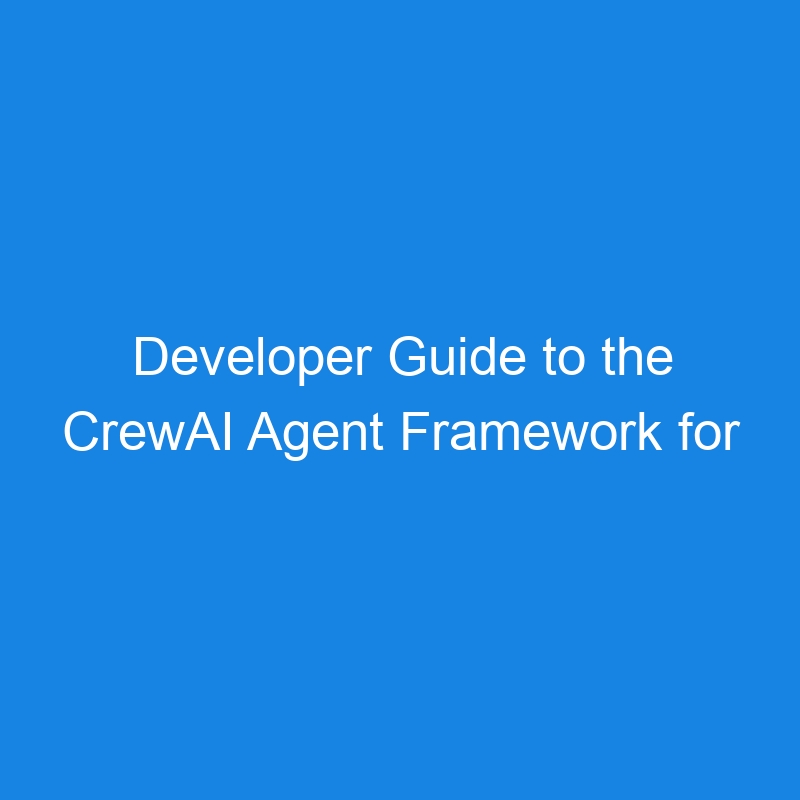
CrewAI is one of the most popular Python frameworks, designed to enable intelligent multiagent collaboration — transforming the way developers approach complex AI workflows. Unlike traditional single-agent systems that operate in isolation, CrewAI introduces autonomous AI agents that work together as a team — each agent fulfilling a specialized role, equipped with specific tools and working toward clearly defined goals. By fostering human-like collaboration and leveraging advanced workflow management, CrewAI provides developers with a powerful toolkit for building intelligent, scalable and adaptable AI systems.
CrewAI and the Anatomy of an AI Agent

CrewAI adheres closely to the principles outlined in the above illustration, which breaks down the anatomy of an AI agent into key components: Persona, Instruction, Task, Planning, Memory, Tools and Delegation. Each of these elements is fundamental to the design of CrewAI agents, enabling the creation of intelligent, role-specific and collaborative AI systems.
For a detailed explanation and background, refer to my previous article on the anatomy of an AI agent.
Persona
CrewAI allows developers to define a clear persona for each agent by specifying its job function and a detailed backstory. This ensures the agent behaves consistently and is in alignment with its intended role. For instance, an agent might be configured as a market research analyst with expertise in identifying emerging trends. This persona helps guide the agent’s actions and decisions throughout the workflow.
researcher = Agent(
role='Market Research Analyst',
goal='Identify emerging market trends',
backstory='An experienced analyst specializing in technology and startups'
)
The persona creates context for the agent’s behavior, making its responses and actions more tailored and relevant.
Instruction
Instructions in CrewAI define the job description for an agent, specifying how it should approach its task. CrewAI allows developers to provide clear, structured instructions to each agent, ensuring that its goals are well understood and actionable.
research_task = Task(
description='Analyze industry reports to identify top emerging technologies',
agent=researcher
)
The instructions directly influence the task-execution process, ensuring agents operate within the defined scope of work.
Task
Tasks are the actionable elements that agents execute. CrewAI seamlessly combines tasks with agents’ capabilities, ensuring that roles align with specific job assignments. Agents work on their tasks independently or collaboratively, depending on the chosen workflow (e.g., sequential or parallel). CrewAI enables clear task delegation to ensure each agent knows its objective.
Planning
CrewAI supports planning by allowing workflows to be executed in sequential, hierarchical or parallel modes. Agents can act strategically, dynamically coordinating with one another to achieve shared goals. Planning aligns individual agent actions with broader workflows, ensuring efficiency and consistency. For instance, CrewAI Flows enable agents to chain tasks, execute conditionally or respond to dynamic events.
market_crew = Crew(
agents=[researcher, writer],
tasks=[research_task, writing_task],
process='sequential' # Workflow planning
)
This approach emulates real-world team collaboration, where roles and responsibilities are defined under a shared strategy.
Memory
Memory allows agents to retain historical context during task execution. CrewAI agents can be configured with memory to recall previous interactions, ensuring continuity and coherence in workflows. This is particularly important in long-running processes where agents must adapt based on past outcomes.
researcher = Agent(
role='Research Analyst',
memory=True, # Retains interaction history
goal='Analyze historical data trends for insights'
)
With memory enabled, CrewAI agents can operate contextually, building upon prior results to deliver better outcomes.
Tools
CrewAI agents integrate skills through tools that extend their capabilities. Whether the task requires web searches, data extraction or PDF analysis, agents can leverage tools to access and process external information. CrewAI supports a variety of tools, such as PDFSearchTool and SerperDevTool, allowing agents to retrieve and analyze data efficiently.
from crewai_tools import PDFSearchTool
research_tool = PDFSearchTool(pdf='industry_report.pdf')
researcher = Agent(
role='Research Analyst',
tools=[research_tool],
goal='Extract insights from the industry report'
)
Tools empower agents to perform specialized tasks beyond what an LLM alone can achieve, enhancing their overall effectiveness.
Delegation
Delegation is an essential feature of CrewAI that enables team management and interagent communication. Agents can dynamically assign subtasks, collaborate and share information to optimize workflows. CrewAI supports structured delegation within hierarchical workflows, where a managing agent oversees task distribution and validation.
For example, a team lead agent can delegate analysis tasks to researchers and content generation to writers, ensuring that workflows progress smoothly.
manager = Agent(
role='Team Lead',
goal='Oversee research and content generation',
allow_delegation=True
)
With delegation enabled, CrewAI creates a collaborative ecosystem where agents can adapt to dynamic task requirements.
Conclusion
CrewAI adheres to the approach described in the image by incorporating core components such as Persona, Instruction, Task, Planning, Memory, Tools and Delegation into its framework. This modular and logical structure allows developers to design AI agents that mimic professional teams, enabling advanced workflows that are both intelligent and adaptable. By supporting role-based personas, task execution, planning and tool integration, CrewAI provides a comprehensive solution for building collaborative multiagent systems.
In the next article, we will take a closer look at the framework. Stay tuned.
The post Developer Guide to the CrewAI Agent Framework for Python appeared first on The New Stack.
